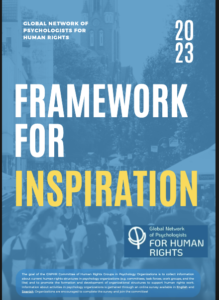How are Psychology Associations involved in Human Rights?
One of the aims of the GNPHR was to develop ideas for good practice for psychology associations in the field of human rights. As a steering group we were in touch with some associations already with committees or sections that had a leadership role on psychology and human rights, but we needed to find out what others were doing. We conducted a survey of all psychology associations to enquire what work they were doing in this field. Respondent told us that they indeed did regard psychology and human rights as an important issue and they reported on activity in this area, but few of them had groups within their associations that lead on it.
The Global Network believes that it’s important that there are ways in which an organisation of psychologists can gather together those people with particular expertise so they can advise their association how best to engage with, for example, their National Reporting Mechanism in their country about human rights violations and indeed areas in which they could celebrate psychology’s role in the protection of human rights.
Following the survey, the steering group decided to form a new network (see below) representing those associations that had established human rights groups, and those that wanted to set ones up, or indeed were just interested in collaborating. The aim is to share best practice and to help other associations consider how they may best cultivate this work in the future.
 Framework for Inspiration
Framework for Inspiration
Guidance for psychology organizations on forms of organizational engagement with human rights and psychology
See as online brochure; download as PDF
National Psychology Organizations
- American Psychological Association
- British Psychological Society
- Psychological Association of the Philippines
- Psychological Society of Ireland
- The Dutch Association of Psychologists (Nederlands Instituut van Psychologen, NIP)
- The Interamerican Society of Psychology (including the Human Rights Commission)
GNPHR Network of Human Rights and Psychology groups
The GNPHR Network of Human Rights Groups in Psychology Associations is open to representatives of psychology associations that have established a committee, office, or subgroup focused on psychology and human rights.
An initial meeting was held in February, 2022, attended by representatives of the American Psychological Association, The Psychological Association of the Philippines, The Jamaican Psychological Society, The Psychological Society of Ireland and the British Psychological Society and the GNPHR steering committee.
There is a new call for organizations to join to discuss the activities of their human rights groups OR to find support for launching one! See here
